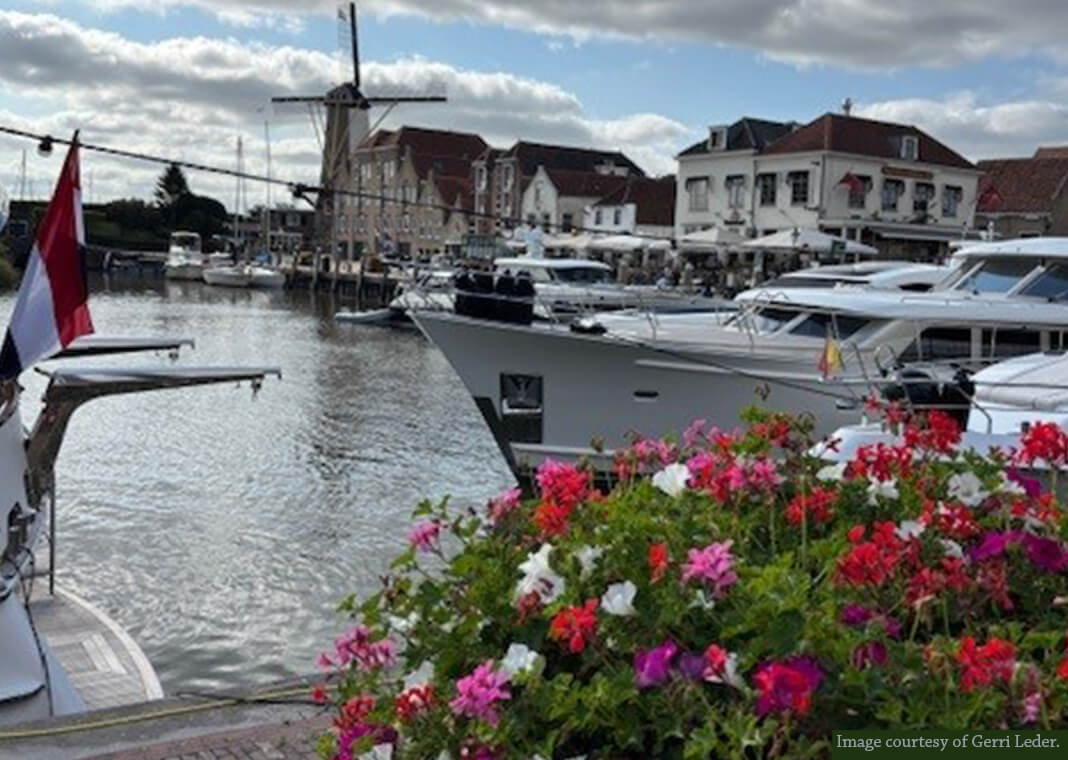
Editor’s note: Sacred Space: The Prayer Book suggests six steps of prayer and contemplation for exploring the daily Scripture passages: The Presence of God, Freedom, Consciousness, The Word, Conversation, and Conclusion. We’ve invited our Ignatian bloggers to explore each step in a series beginning today.
The Presence of God
“‘Be still, and know that I am God!’ Lord, may your spirit guide me to seek your loving presence more and more for it is there I find rest and refreshment from this busy world.” (The Irish Jesuits, Sacred Space: The Prayer Book 2026)
Our line of 14 cyclists moves easily through the countryside on a weeklong bike and barge trip from Amsterdam to Bruges. With lovely scenery, capable guides, and the easy company of strangers who share a passion for cycling, we have all that we could ask for this week.
As I cycle in the middle of the pack, my mind is chattering about the ride, the wind, the close proximity of the rider in front of me, the too-frequent stops, and the mechanics of the bike. Why is my mind restless with these concerns? Where is the stillness I find on my bike that allows me to access a connection to God?
After the ride on day two and a shower on the barge, our cycle tour hosts call for a moment of silence before dinner: gratitude and, just as quickly, “Bon appétit.” By days three, four, and five, I long to find a time and place for sustained solitude and deeper connection.
From city to town to hamlet in the Netherlands and Belgium, we pass ancient churches standing shuttered or locked. Some serve a Sunday-only mandate, and one offers weekday Mass twice weekly, while others have been repurposed for housing, art centers, or stores. Any given weekday, not one is available for drop-in worship. Churches are closed to seekers of stillness or supplication.
How many of these monuments to faith stand empty—ornate and carefully constructed fortresses of faith built for the ages. Faithful residents of the Middle Ages pooled their wages to build the most elaborate and pious symbols of faith. Would a single church have its doors unlocked when we rolled through a historic town for a break? Our cycling resumes a familiar cadence after a break.
I take a turn donning the yellow vest to ride sweep, which means riding in the back all day to be sure no one is left behind. It is here, finally on day six, where I feel God’s sustained presence.
“Don’t sit in the silence, waiting for God to speak,” Thomas Merton wrote in Contemplative Prayer, the slim 1969 volume I packed in my suitcase. “Let the silence speak for God.”
Riding more slowly as the sweep, I guard the rear, eager to assist if a rider falls back or stops the bike for any reason. I invite the divine to speak to me in the quiet of the rural route. We move through the countryside, the sun glistening on the canal. The only movement is the turn of our pedals, an almost rhythmic cadence resembling a meditative state. Here I reflect first on the lush Dutch hydrangeas, plump dairy cows too numerous to count, and a small herd of black Landrace goats lounging lazily next to our bike path. Prayers of wonder, praise, and thanksgiving come more easily. Gratitude flows for the incredible sights, congenial fellow travelers, and the physical fulfillment of cycling the Netherlands.
I feel the presence of God and the desire to continue in the stillness for the rest of the day. Guarding the rear, reflection comes through the daily Examen. I find what I have been longing for, the prayerfulness that Merton calls, “freedom from focusing on my own thoughts, the silent self-forgetting dialogue, and the letting go that makes room for God.”
The stillness is pierced as the leader signals, and the cyclists ahead slow to a stop. The moments of prayerfulness are fleeting, yet I feel renewed by the grace of interior connection. Even in movement there is stillness, and in stillness, an awareness of God’s presence.
My cathedral is the outdoors, and in stillness, the door is always open.
